Original Cookstoves Project
This project, in conjunction with UK based CO2Balance, aimed to provide up to 1000 families in Kisumu, Kenya with highly efficient cook stoves, saving firewood, reducing CO2 production and providing significant health benefits.
We have a long-established partnership with the Aniga Women’s Community Based Organization in Kisumu county, Kenya. Our original project, in association with UK based CO2 Balance, was to provide funding to help them to make energy efficient cookstoves so that they could reduce dependence on open fire cooking with its poor health consequences.
Global Footsteps matched donations for the cookstoves project up to a total of £10,000. So for a £10 donation the project received £20. We were successful in raising an overall £ 20,000 for this project and this experience was base for our new project The Cookstoves Briquettes Project.
A Call For Action!
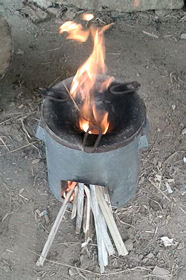
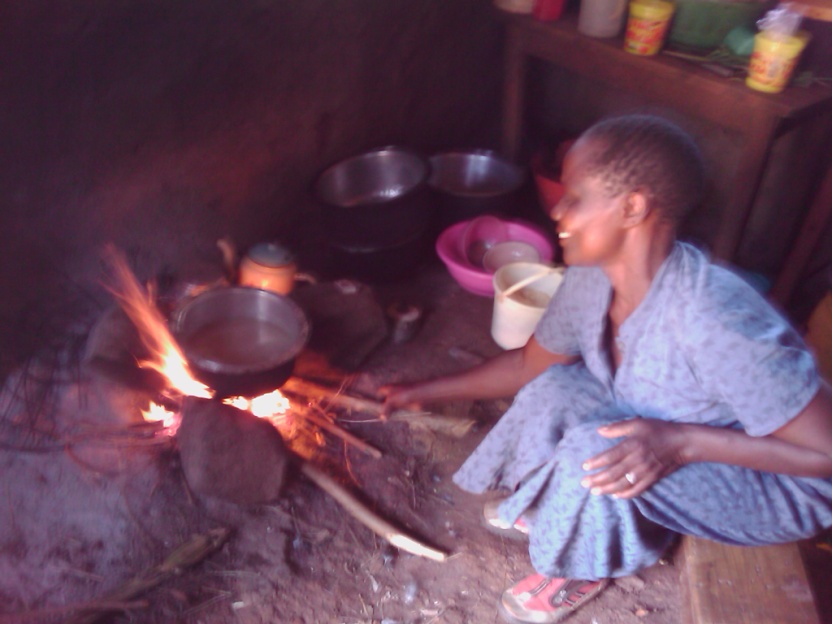
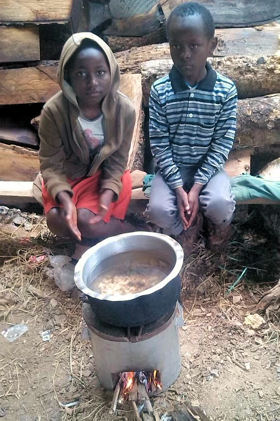
Listen to Alison talking about the project on
BBC Radio Gloucestershire
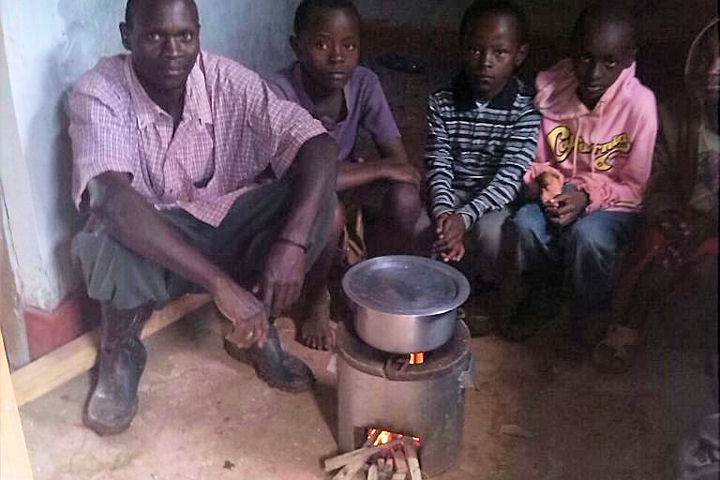
Forget the marshmallows. Cooking on an open fire isn’t fun for thousands of women in Kenya and around the world. It causes chronic health problems and there’s a huge environmental impact too, in deforestation and CO2 emissions.
Our original project, in partnership with Taunton based company CO2balance UK Ltd., and the Aniga Women’s Group in Kisumu, Kenya, aimed to provide energy efficient cookstoves
which use around a third of the wood consumed by a traditional cooking fire. Global Footsteps matched the money raised, to pay CO2balance to train the women and buy the raw materials to make the stoves – using local staff in Kisumu.
These stoves, produced by local women from local resources, had enormous benefits. They significantly reduced the amount of toxic smoke that is produced which has considerable health benefits. The women don’t need to gather so much firewood, giving them time for other more economically beneficial activities. There are also environmental benefits in reduced carbon emissions and less deforestation.
The project was totally sustainable as all the materials used to build the stoves were produced locally. The stoves were sold at an affordable price, and the income allowed the women to buy more materials and train more people. Local women, led by the Aniga Women’s Initiative, were trained to manufacture them and given support in marketing and promotion. The Aniga women are a well established group who already have a number of self-help projects in rural Kisumu. They have had strong and positive links to Global Footsteps over a number of years.
Efficient cookstoves projects are a tried and tested method of improving women’s lives and reducing carbon emissions in the developing world.
Share it!
Watch some footage from the video of cookstove production below.
https://www.youtube.com/watch?v=xZZ7I9nO0s0&feature=youtu.be
The Problem
High efficiency wood-burning stoves are important for many rural areas in Africa. These are some of the benefits they can bring.

Health
Daily exposure to toxic smoke from cooking on open fires in poorly ventilated kitchen areas is a major risk factor for disease and premature death.
The risk is higher for children, who often do homework or even sleep in the kitchen area.
More than half the deaths of children under 5 are due to pneumonia caused by inhaling particulate matter from open fires.
The risk is also higher for women, who tend to do the cooking.
Health effects are exacerbated for individuals who are HIV positive, when it is particularly important to avoid infection.

Environmental
90% of energy in rural Kenya is met through wood as a fuel
Reducing deforestation is critical to biodiversity and reducing the effects of climate change.
Over 90% wood taken as fuel is not replenished. Increasing drought means new trees planted don’t thrive.
Forest cover in Kenya has decreased by about 7% since 1990 (an area the size of Oxfordshire).
Fewer trees mean less carbon absorbed.
Burning wood on open fires causes carbon emissions and air pollution.

Economic
Time spent collecting firewood from increasingly long distances detracts from income generating or other activities – the burden mainly falling on women.
Children also collect firewood, thus detracting from educational activities and exposing them to danger.
Firewood that is bought, is increasingly expensive due to shortages, and can form a high proportion of household expenditure.
Different ways you can support this Project
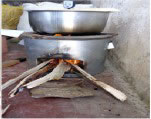
Give a Cookstove
At our donation page of a present for a friend or family member.
We will send you a gift card to give to them explaining the project. £20 will help fund one cookstove*.

Make a Donation
At our donation page, by cheque made out to Global Footsteps or in person at our Café, at Food Loose in Cheltenham.
Global Footsteps will match donations until we reach our target.

Calculate your Carbon Emissions
Use the CO2 Balance calculators to calculate your carbon emissions.

Spread the word
Our project will provide energy efficient cookstoves in rural Kenya. Book a talk for your friends or local group.
Q: The project is for 1,000 cookstoves – where are all the families that you believe will have them?
A: West Kisumu has a population of 30,000, with 10 sub-locations. We will target 2 sub-locations with 3,000 people in each – West Reru and East Reru. This is where the Aniga women are based.
Q: Have you seen the CO2balance stoves? Are you confident that the families will like them?
A: Yes – they are good quality stoves, better than some of the others. One household already has one, and everyone is very interested. The main interest is Cook Stove Kidsbecause there is a shortage of firewood, so people are interested in anything that will conserve it. Many families collect the firewood, which takes time, so other things are neglected. The families that can afford to buy firewood are keen to save money. Most of the families use 3 stone fires for cooking.
Q: Are the Aniga Women keen to start learning how to make them? How many people do you think will get involved in making them?
A: Yes we are very keen. We have been talking about it since you came to Kenya 3 years ago(!) a group of 20 women would do the training initially, then they can train others.
Q: We would be interested in supporting you to develop an ongoing project making more cookstoves to sell. Do you think there will be a market for this? Do you think this is a good idea, to provide ongoing employment and income for the women?
A: Yes – marketing will be easy – to the other sub-locations in west Kisumu. We will use the supermarkets to sell them – they are keen to support the local economy where there is a well-made product to sell. They will need to make a profit on the sale.
The primary motive for the Aniga women was to have stoves for themselves and their families and neighbours, and thus for their lives to improve. The longer term aim is to get skills and employability.
Q: Do you have ideas where the training might take place? Also where the materials and finished stoves might be stored?
A: The training will need to take place in Reru, where the women are living. It will be possible to get a venue for the training. Some electricity will be needed for making the stoves – which is scarce in the area, but it should be possible. Also somewhere to store the stoves.
We are ready to start as soon as possible. It would be good to make the stoves during the dry season, to sell in the rainy season, when getting suitable firewood is even harder. The rainy season starts in December.
Our original donation for the project back in 2016 was 20,000 which would train the Aniga women to make energy efficient stoves for their use and to sell in their area.and it was planned that the Charity would redeem part of the donation through fund raising in the United Kingdom through members and the public. This was split between a donation of 10K from Global Footsteps and 10K from donations from our members and the public. That was largely achieved as was the sale of the original cookstoves made by the Aniga Women. The finalisation of this project and the lessons learned enabled us to move on to the Cookstoves Briquettes project.
Our current project is one with new improved cookstoves with a design that allows the use of briquettes made from agricultural waste, ensuring they have more efficient and healthy cooking equipment in their local community, and an income derived from selling the products to other communities. Read more at Cookstoves Briquettes project.
YouTube Channel

If you ‘d like to see more about the Cook Stove Project in Kenya, you can just pay us a visit on our brand new Channel on YouTube. Tune up with us!

